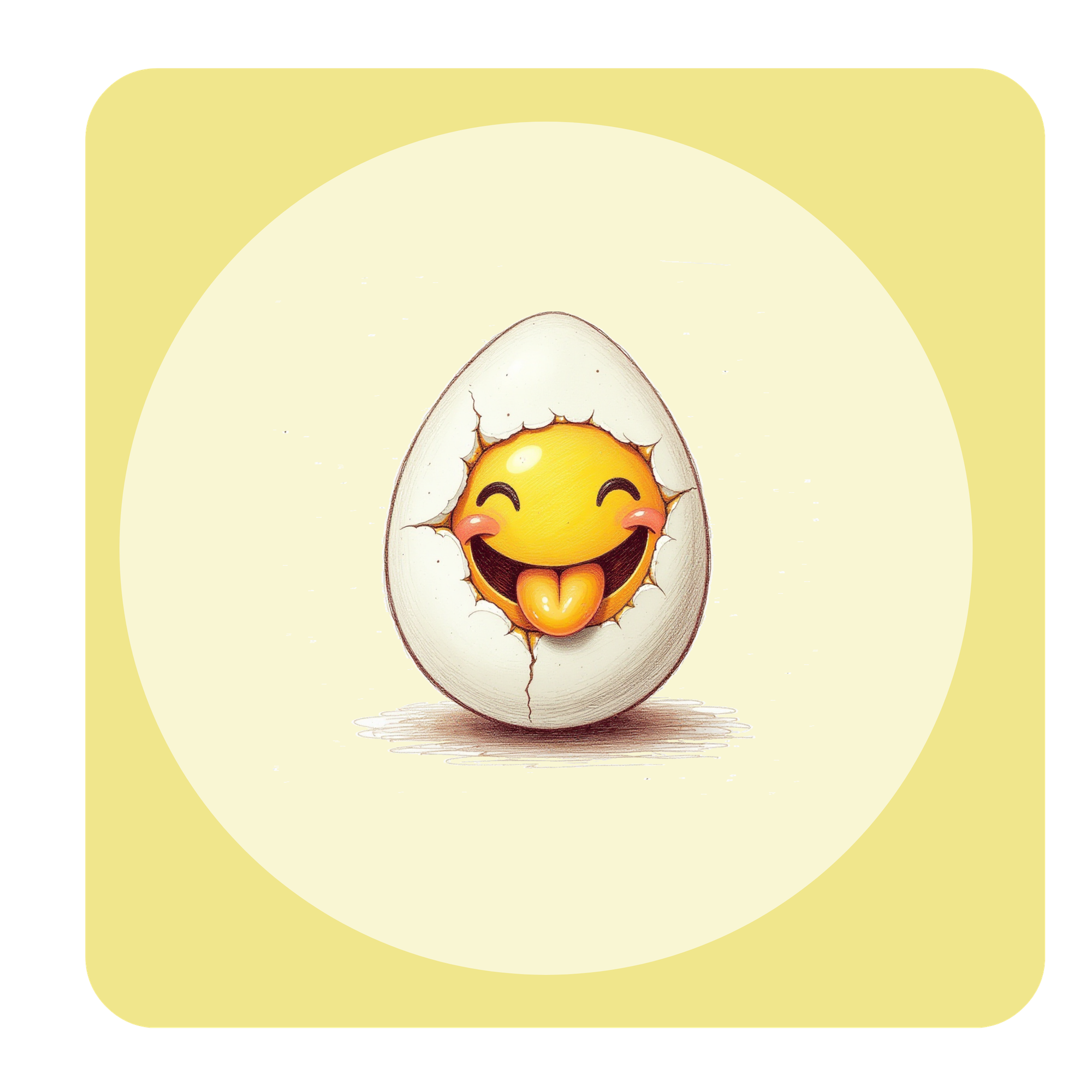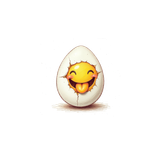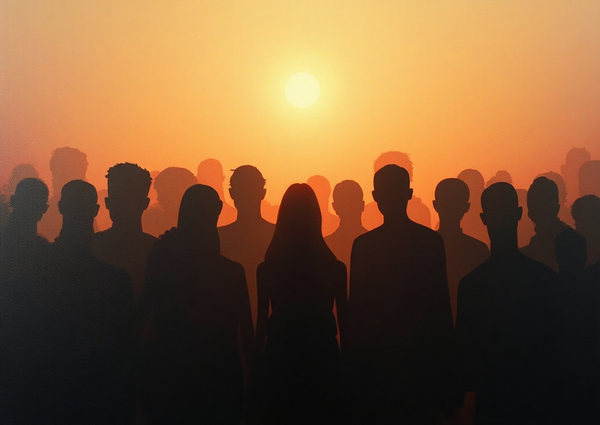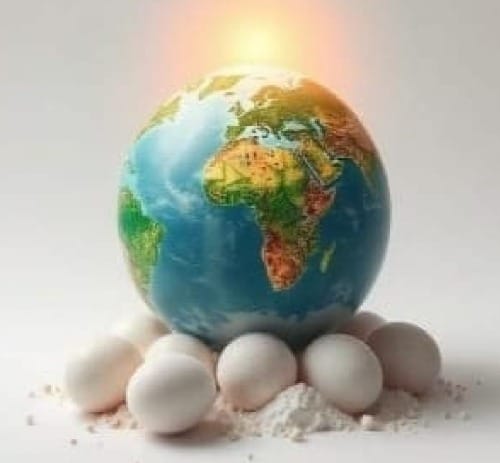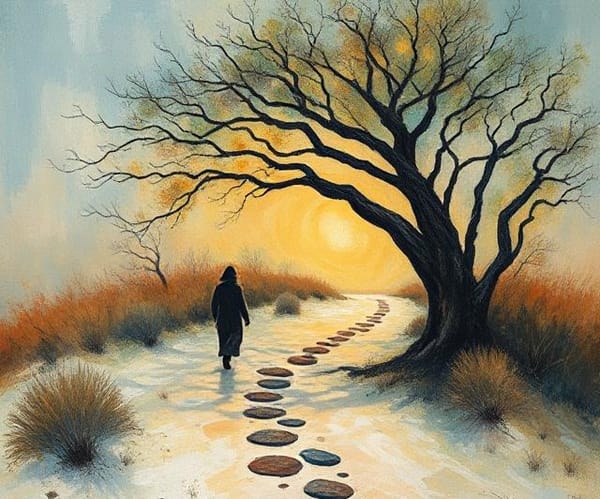From eggs to existentialism
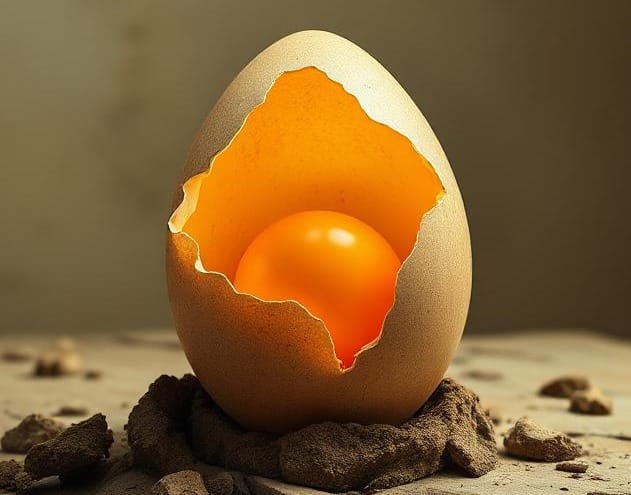
How human consciousness evolved from the egg
It is predicted that eggs first hatched into the world around 1.4 billion years ago. Not exactly the eggs we know of today but some specialised cells that would combine with specialised cells of another organism and produce a brand new organism. The first stages of reproduction, prior to these ‘egg’ cells were single celled, where means of reproduction are a split of that single cell, producing two identical cells. Variety and so, evolution, was born through this first ‘egg’.
We started our journey towards homo sapiens as these humble single celled organisms and progressed into various types of multi celled organisms that reproduce sexually. Reproducing sexually means that half of the organisms chromosomes come from the paternal parent and half from the maternal. The two halves, in general speak, are the egg and sperm. These mesh together and form a new organism, which starts multiplying its cells and voila, a living being.
Eggs first came about whilst all life was still underwater, they were laid in the water as jelly like sacs, much like frogs spawn or fish eggs are today. The undeveloped eggs were laid and then fertilised by the male, out in the open.
Going back through our line of evolution, our egg laying ancestors were called amniotes, existing some 300+ million years ago. Amniotes eventually branched off into various types of bird, reptiles and most importantly for us, mammals.
Amniotes were the first to give birth to eggs with a hardened outer shell. A shell able to retain moisture whilst able to allow for the cycle of oxygen: in, CO2: out. This is the stage where the egg is fertilised within the mother and an embryo is grown internally and birthed within an egg to complete its development while under the care of the mother (and in some cases the father) in various forms of nests until ready to hatch, most birds and reptiles still function in this way today.
This magnificent step allowed animals to venture out of the water to lay eggs, and so began a new era of our evolution, animals on land.
Some 100 million or so years later, we see the introduction of mammals, egg laying mammals but all the same, milk producing, hair covered, warm blooded mammals. These were little shrew or possum like creatures. We are still in dinosaur times here believe it or not, mammals started quite a way back, and a few very special species managed to survive the ‘Great Extinction’ and thank goodness for us they did.
It is here is where the evolution of the egg starts to get really interesting. For within a timespan of about 60 million years mammals developed the ability to birth live young and evolution diverged between placentals (mammals that carry young to full term with the help of a placenta, humans included here) and marsupials (mammals that birth severely underdeveloped young and carry them in pouches). The interesting part is how this affected mammals, and how it was advantageous and possibly vital to our survival.
Lets look at a few of the advantages and disadvantages of carrying live young. Inception becomes a lot more likely, especially compared to the male shooting his sperm at a pile of eggs and hoping something sticks. Having young come to full term within the mother also protected the young for a long time, from predators, from environment, from lack of resources although it can make the mother very vulnerable, growing another being inside you is extremely taxing on the body’s resources. The mother is in engaged in quite a battle for resources during pregnancy, which can be a risk factor. While movement may be harder during pregnancy compared to not being pregnant, mobility is far easier and more manageable than having to carry a nest full eggs if one has to relocate suddenly.
Animals (there are interestingly enough a few species outside of mammals that birth live young and even a species of lizard that has been known to birth both live young and eggs, depending on various factors) that birth live young usually have smaller litters, this means that each child gets more specialised care, the disadvantage here of course is less offspring and a slower reproductive rate, which is why more care is given for the few animals that do make it to term.
As monkey species and eventually hominids emerged, their gestation was becoming quite a long affair. Litters were becoming smaller, and this event lead to the most crucial part of our current development. This meant that our heads could get bigger. More time, nutrients and space was needed for this process. Mammals have the largest brains among animals, with human brains being the biggest, relatively. Homo sapiens specifically started to be born with heads much bigger than their bodies at birth, with the heads only around 30% of their eventual total mass. This means humans grow their big old craniums well after leaving the womb. In fact we keep growing our brains until around age 25. With 80% achieved by age 5, that last bit grows rather slowly.
So why did humans start this slow brain growing process? Surely its not the optimum for survival. Brains need a lot of energy to run, a lot of specific fats and sugars and all of that adds up to a pretty good treat for any predator, so why the risk?
It seems that human behaviour made this possible and why can’t really be determined. There is evidence to suggest that early hominids helped each other through difficult child births (something no other animals do) in order to survive, which could be one reason for our close societies and way of creating community. I think human brains evolved alongside what humans did for it.
Humans can have one baby every year or couple years, and that baby is extremely dependent. Other mammal species are born already able to walk and are independent just a few years after that. But us humans, with our big brains, need time, and we need help. And what do we do in all that time? What is so hard for us to learn that every other species doesn’t have to go through?
Society, basically. A small child has to not only learn motor function and how to get food but also speech, communication, reading and expressing emotion, pattern association, complex problem solving and so many more things we do with our giant brains.
The egg got us this far, it evolved and evolved until it left us with internal fertilisation, a magnificent life fuelling placenta and live birth. Humans turned this into living and working together, sharing resources and at some point language, which is a key feature in what separates us from other mammals and how we are able to live as we do. The adaptation of language gave us one feature that completely distinguishes us from all other life, we can share reality. We don’t just communicate with signs, or on need. We share ideas, we share emotions and we collectively share concepts, money being the strongest example in our culture. We have a single linked collective experience powered by, a now, 8 billion individuals.
This seems to be were ‘self awareness’ became a topic for us. We could speak and communicate our ideas to one another and my guess, is pretty quickly someone asked, what am I? Soon followed by, who am I?
It was Descartes who famously decided that we could declare our own existence simply because we could think about it, “I think therefore I am”. Millions of years of evolution, countless extinctions of various species and so many different harsh environments all led to a human beings ability too ask, but why me?
What the human brain is, how it evolved, what its limits are, are just a few of the questions so many scientists are trying to answer today. The brain is an especially hot topic in todays world, and with good reason, so little is actually known about it. Were we always meant to become aware? Did consciousness want to experience itself? Is all of this just a giant mistake, a great cosmic joke that a human being must go through life forever wondering why it is here in the first place?
Whatever your stand is on faith, on a creator vs creation, what we can learn from our own history of evolution is how human behaviour has influenced it greatly, without even being aware of it, just on the drive of survival. I think we are at a point in our evolution where we could influence our future knowingly and purposefully, but we currently seem to be our own worst enemy.
I see a shift in the world today, so many people waking up to the world around them and to themselves. It is true that collective consciousness is always behind the individual, which is why people often feel so frustrated in society. Think of it this way, when you are alone or maybe with a close friend or two, you can really get into something niche, explore a topic in-depth but when you get into a larger group everyone has to compromise and sacrifice to find something everyone agrees to talk about or listen to or watch. This is the state of the world, always really. But as each individual reaches new tiers of awareness they can lift the collective, after all each individual is part of the collective. And soon you find yourself at a very interesting party with a number of people getting into quite deep or abstract topics, not just within your circle.
I am generally an optimistic person and I do not want to believe we came so far, from that little egg that was a just a clump of special cells, just to run ourselves into the ground or off it, rather.
I think about our evolution all the time, where we’ve come from and where we will go from here and all I’ve learned so far is no matter what happens, the right here, right now is a pretty good time to be happy.
Never be afraid to be a little eggstra,
Gina Ova
References
J.R. Stewart, 1997 https://www.semanticscholar.org/paper/CHAPTER-9-%E2%80%93-MORPHOLOGY-AND-EVOLUTION-OF-THE-EGG-OF-Stewart/addaffec95b8e3b37c76dd9ec03cff2376ce62de
Karen Carr, 2017 https://quatr.us/biology/eggs-evolution-biology.htm
Dana Najar, 2020 https://www.quantamagazine.org/egg-laying-or-live-birth-how-evolution-chooses-20200518/
Cat Bohannon, 2023 'Eve, How the female body drove 200 million years of human evolution.'
